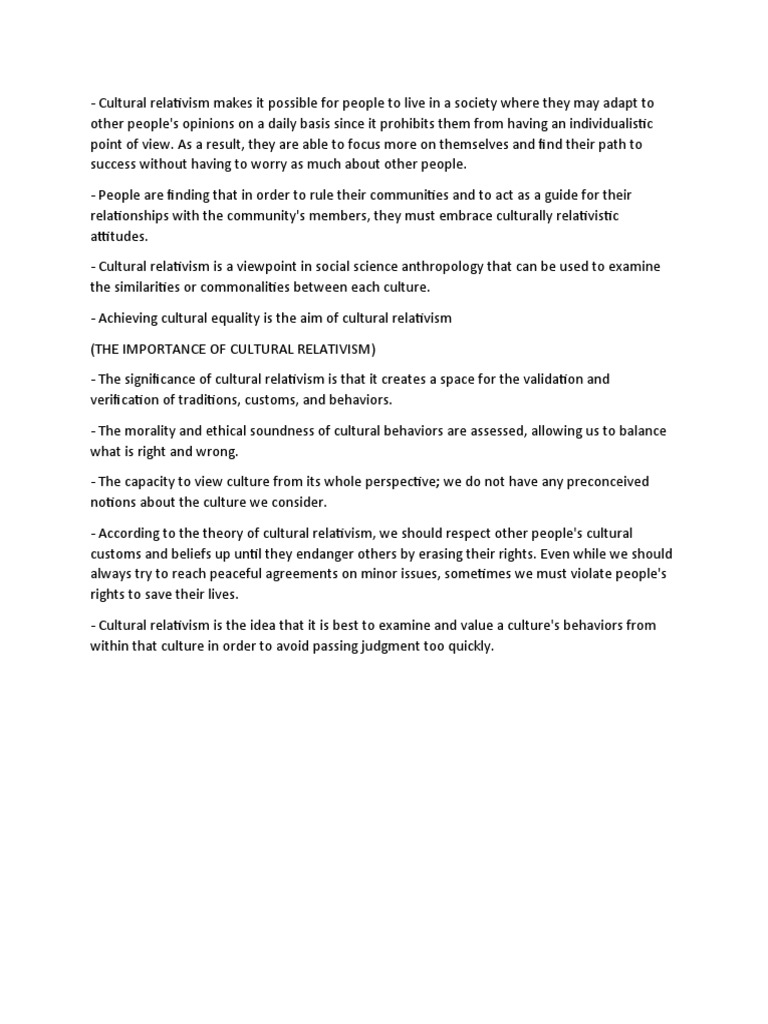Cultural relativism, an informative exploration of the multifaceted nature of human beliefs and practices, serves as a crucial lens through which America’s identity can be understood. It underscores that societal norms and values are not universally applicable but are instead contingent on contextual, historical, and geographical circumstances. This becomes apparent when examining various examples of cultural relativism woven into the rich tapestry of American society.
One striking exemplar of cultural relativism in America can be found within the myriad belief systems upheld by the Indigenous tribes. From the Navajo with their profound connection to the land to the Lakota’s spiritual reverence for the buffalo, these diverse worldviews encapsulate a particular relationship with nature that exists outside the dominant Western paradigm. The Navajo concept of “hózhó,” which translates to a harmonious balance of beauty, health, and equilibrium, showcases a cultural framework that prioritizes environmental stewardship over material wealth. It illustrates a worldview steeped in spiritual fulfillment derived from environmental harmony rather than exploitation.
Transitioning from Indigenous traditions to contemporary practices, one observes the rising acceptance of alternative lifestyles, with a notable emphasis on environmental sustainability. The growing popularity of veganism is not merely a dietary choice but reflects a broader cultural shift toward ethical considerations surrounding animal rights and ecological impact. In America, this movement transcends taste preferences, embodying a moral imperative to eschew practices that contribute to environmental degradation. The appeal of veganism resonates deeply with a segment of the population, emphasizing compassion and respect for all living beings, thereby creating a distinctive cultural narrative grounded in empathy.
Moreover, the phenomenon of multiculturalism in America illustrates cultural relativism in its vibrant coexistence of various traditions. Cities like New York, Los Angeles, and Houston serve as melting pots where festivals such as Diwali, Lunar New Year, and Juneteenth are celebrated with fervor. This cacophony of cultural expressions embodies the essence of cultural relativism, as each community brings its own customs and beliefs to the forefront, enriching the American experience. For instance, the Mariachi music of Mexican heritage encapsulates joy and celebration, while also addressing themes of struggle and resilience. The juxtaposition of these diverse cultural elements showcases the beauty inherent in their uniqueness, highlighting how they come together to create a unified yet multifaceted identity.
Furthermore, American cultural relativism can be elucidated through the lens of religious practices. The First Amendment guarantees freedom of religion, leading to a mosaic of faiths that flourish within the nation. From the Quaker commitment to peace and social justice to the vibrant expressions of Islam, each belief system shapes its followers’ lives uniquely. The heterogeneity of these practices fosters an environment of mutual respect and dialogue, wherein individuals learn from one another rather than imposing a singular narrative. This acceptance of various spiritual perspectives ultimately enhances the social fabric of America, promoting tolerance and understanding amidst differences.
On a more microcosmic level, cultural relativism manifests in local traditions and customs that may appear unconventional at first glance. Take, for example, the American phenomenon of tailgating—a ritual that brings sports enthusiasts together to celebrate team spirit, community, and camaraderie. While it may seem trivial or eccentric to outsiders, tailgating reflects a profound cultural significance for many Americans, serving as a form of social bonding and shared identity. Here, one can see how cultural practices, no matter how quirky, reveal deeper values of togetherness and loyalty.
Moreover, consider the manner in which different regions in America celebrate their historical narratives. The South emphasizes its heritage with events such as Mardi Gras and country music celebrations, laden with symbols of its distinct identity. In contrast, New England commemorates its puritanical roots through historical reenactments and fall harvest festivals. Each regional interpretation of history encapsulates unique cultural perspectives, emphasizing how history is not a monolithic account but rather a tapestry of different interpretations rooted in local experiences and narratives.
In the realm of education, the American approach to cultural relativism is evident in its increasingly diverse educational curricula that include multicultural perspectives. Schools are now more often incorporating lessons that celebrate various ethnic histories and experiences, fostering a sense of belonging among students from different backgrounds. This educational shift not only imparts knowledge but also cultivates empathy and awareness among future generations, promoting the idea that no single perspective dominates the understanding of history or culture.
Ultimately, cultural relativism in America serves as a reminder that human experiences are as diverse as the landscapes that define the nation. From Indigenous worldviews to contemporary movements that value ethical choices, from regional customs to varied religious practices, each facet contributes to the rich, intricate mosaic of American culture. Understanding and appreciating this diversity empowers individuals to engage with one another with greater respect and sensibility. In turn, cultural relativism within this context acts as a catalyst for deeper connections between communities, fostering an ongoing dialogue that thrives on mutual understanding—a necessity in an ever-evolving global society.
